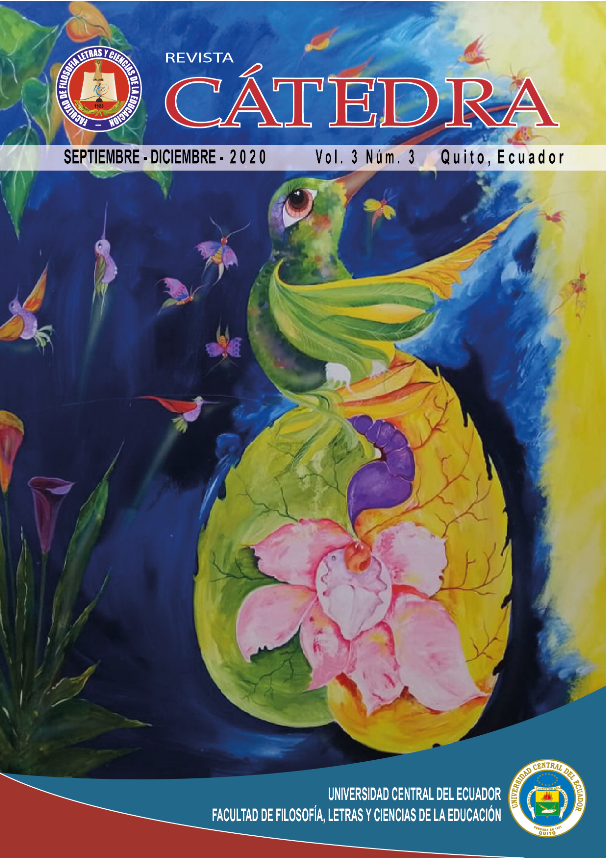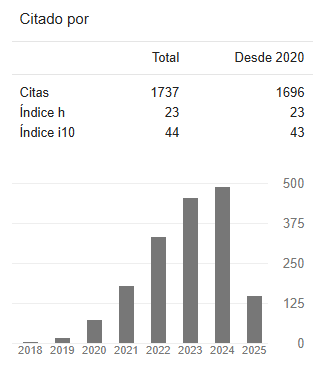The vindicating voice of Gamaliel Churata and José María Memet from the Andean philosophy
DOI:
https://doi.org/10.29166/catedra.v3i3.2516Keywords:
Complementarity, Andean philosophy, Latin American poetry, vindication, relationality, social valuesAbstract
Vindictive literature is a source of thought, resistance and commitment to human beings and society. These characteristics are present in the poetic compositions of Latin American writers who have oriented their work towards committed literature. This study has brought together the voices of two representatives of Latin American poetry: Gamaliel Churata and José María Memet. They address the issue of vindication with respect to Western hegemony, so the reason for their poetic work is to show those who have been relegated from society. From this premise, the objective of this study is to expose the lines of thought developed in the literary production of these two poets. Churata's, configured from the indigenism, while Memet's from the contemporary Latin American poetry. In both historical moments it is demonstrated that the hegemonic thought does not dominate the language of the art, since this one, by itself, becomes a space where the vindication is constructed, as an alternative to the system imposed from the west. The analytical-synthetic method and documentary research have been used to carry out this study. Thus, the precepts of Andean philosophy will be applied from Josef Estermann's vision, in the interpretative analysis of the poems Holocaust of All Love for Him by Gamaliel Churata and The Mission of Man by José María Memet. In this way, the vindictive features that emerge in the mentioned lyric compositions regarding the principles of the Andean philosophy will be identified.
Downloads
References
Bustamante, G., Bañuelos, J., Bohórquez, A. (2016). La poesía como resistencia y representación social. Recuperado de:
http://www.scielo.org.mx/pdf/ap/v37n2/0185-3082-ap-37-02-00087.pdf
Echeverría, Bolívar. (2005). Vuelta de siglo. México: Fundación editorial el perro y la rana.
Eagleton, T. (2013). Marxismo y crítica literaria. Buenos Aires: Paidos.
Estermann, J. (2006). Filosofía Andina, Sabiduría indígena para un mundo nuevo. La Paz: ISAET.
Estermann, J. (2013). Ecosofía Andina. Recuperado de:
https://www.uraqi.cl/filosofia-andina/
Guerrero, Patricio. (2010). Corazonar. Una antropología comprometida con la vida. Miradas otras desde Abya Yala para la decolonización del poder, del saber y del ser. Quito: Ediciones Abya Yala.
Macas, L. (2010). El Sumak Kawsay. Antonio Hidalgo Capitán (Ed.) Huelva: Centro de
investigación de migraciones, pp. 179-192.
Medinaceli, A. (2020). Hito radical: una lectura de interludio bruníldico. Recuperado de:
https://ddd.uab.cat/pub/mitologias/mitologias_a2020v21/mitologias_a2020v21p99.pdf
Memet, J. (2019). Mapuche, la tribu de las palabras. Recuperado de :
https://www.escritores.cl/ediciones/articulos2/Libro-Mapuche-Jose-Maria-Memet-2020.pdf
Orrego, I. (2015) Descolonialización epistémica. Aportes del pensar andino abyayalanse a la
Filosofía. Recuperado de:
https://revistas.usantotomas.edu.co/index.php/cfla/article/view/2199
Quijano, A. (2007). Colonialidad del poder y clasificación social. Santiago Castro-Gómez,
Ramón Grosfoguel (Comp.) Bogotá: Siglo del Hombre Editores, pp. 93-126
Retamar, R. (1995). Para una teoría de la literatura hispanoamericana. Santafé de Bogotá:
Instituto Caro y Cuervo
Selden, R. (2000). Teoría literaria contemporánea. Barcelona: Ariel
Sobrevilla, D. (2008). La filosofía andina del P. Josef Estermann. Quito: Abya Yala, pp. 231-247
Torres, E. (2015). “El rol de la mujer indígena en la comunidad inti waykupunku del cantón
otavalo-provincia de Imbabura”. (tesis de pregrado) Pontificia Universidad Católica del Ecuador, Quito.
Usandizaga, H. (2009). El pez de oro, de Gamaliel Churata, en la tradición de la literatura
peruana. Recuperado de
Downloads
Published
Versions
- 2021-01-07 (2)
- 2020-09-29 (1)









